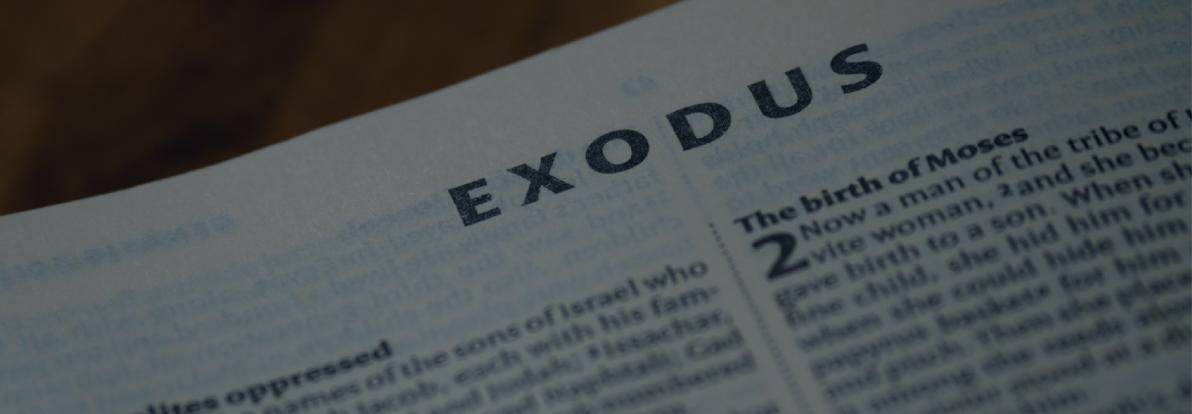
What's in a name?
We saw last time from Genesis how calling is foundational to our identity as God’s people. Consciousness of this helps to maintain our focus on God’s initiative. But while we can know in our heads that we are called to mission, we can all too easily begin to weary of one more call to greater involvement. Like Israel in Egypt, to whom stories of the God of Abraham, Isaac and Jacob had lost all sense of relevance to daily life, we have almost become immune to the call. What is the solution? Another book? A rousing sermon? The next must-not-miss conference on church-planting? More than any of these, we need a fresh revelation of God.
God revealed
The book of Exodus is not just a story about a people being freed from captivity. There is a growing intimacy and understanding of the God who calls. Indeed, I conclude that Exodus’ chief contribution to Biblical faith is precisely how God reveals himself throughout the book. Called ‘The Names’ in Hebrew, we may expect to be introduced to main characters of the times, if so, we will be disappointed. The most powerful man on earth at that time - Pharaoh- remains unnamed, in contrast to the lowly Hebrew midwives. In chapter two, everyone referred to before Moses is nameless and described functionally - man, sister, servant, daughter etc. It all gives a sense of impersonal mundaneness. The weariness apparent in the Israelites by the end of chapter two is perhaps paralleled by the boredom of Moses; I wonder, ‘Did he try to name his sheep?’
May I ask, ‘How do you perceive the Christian life?’ Is it reduced to a list of functional labels - pastor, elder, deacon, Sunday school teacher - with corresponding tasks to fulfil? Sadly, we live at a time where titles or labels are more important than names. That leads to functional rather than personal relationships - terrible in human relationships, infinitely worse if that marks our relationship to God. Eugene Peterson warns of what he calls ‘our contemporary unbiblical preference… for information over story’. This often marks the way we think about God today, as well as our strategising on mission. Peterson goes on ‘We typically gather impersonal (pretentiously called “scientific” or “theological”) information, so that we can take things into our own hands and take charge of how we will live our lives’.1
A careful reading of Exodus will help us avoid this trap. Exodus is not just an amazing narrative; it is also an astounding revelation of the character of God, one we must not ignore. From start to finish, it is a fascinating study of how God reveals himself. Time and space only allow us to examine one of the three major revelations, as I see it, in chapters 3-4, 19-20 and 32-34. I encourage you to do your own mediation on the others.
A meeting like no other
When Moses arrived at Mount Horeb, nothing suggested anything other than another routine day. What transpired was a meeting with God which was possibly ‘the decisive one for all Old Testament faith’.2 This is so because God reveals his Name, making this a unique moment in history (see 6:3). Everything Moses does, and everything Israel becomes, flows from this moment. God had just revealed his intention to intervene on behalf of his oppressed people. Great news! I’m sure we look out on our world today and regularly ask God to intervene. But then the words Moses didn’t expect (or want) to hear- 3:10 are spoken - ‘I will send you to Pharaoh’. That’s when God revealed his name. Moses didn’t need the newest strategy, a self-help book or ‘52 Simple Steps on How to Free Slaves’. As Tim Chester says, to fulfil the task God calls him to - ‘he needs a greater sense of God’s presence’.3
We saw in Genesis with Abraham’s calling that the initiative is all of God. Egypt is ‘synonymous with death’, the antithesis of what God created the world to be. Peterson explains in his characteristic style how once again ‘I AM takes the initiative. That marked the historical turning-point in what has become the long, continuing collapse of using death and the fear of death in the lucrative and complex business of selling religious insurance’.4 God’s self-revelation is a mission call like no other.
Know your God
In his introduction to Knowing God, Jim Packer states: ‘Ignorance of God - ignorance both of his ways and the practice of communion with him - lies at the root of much of the church’s weakness today’.5 Is this also at the root of a decreasing mission vision? God wants to reconcile sinful men and women to himself. But he also wants to use us as his instruments, just as he chose to send Moses to confront Pharaoh. If Moses had not gone, that would class as gross disobedience; so it is for churches that do not respond to God’s call to involvement in worldwide mission. If we find this challenging, can I encourage you not to ask for more resources or abilities; rather, ask for God to reveal himself afresh. Become captivated with Jesus and his presence and the rest will follow. As Chester again reminds us ‘If you’re struggling to obey God, you don’t need more willpower. You need to know God more’.6
Knowing God better necessarily leads to serving God better. Having heard the call, and understanding who it is who calls, the only legitimate response is a total commitment and dedication to the task. That will take us next time to the centre of Torah - Leviticus.
FOOTNOTES:
- Eugene Peterson, The Jesus Way. Publisher: Hodder & Stoughton, 2007, 73.
- Walter Brueggemann, Old Testament Theology: An Introduction. Publisher: Abingdon Press, 2008, 2.
- Tim Chester, Exodus For You. Publisher: The Good Book Company, 2016, 35.
- Eugene Peterson, Christ Plays in Ten Thousand Places. Publisher: Wm B, Eerdmans, 2005, 159.
- Exodus For You, 27.
- Exodus For You, 65.



